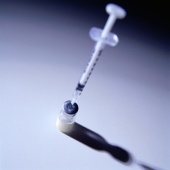
THURSDAY, Oct. 11 (HealthDay News) — The company at the center of the ongoing meningitis outbreak appears to have violated Massachusetts law by producing and distributing large quantities of a contaminated steroid compound, a state health official said Thursday.
According to Massachusetts law, so-called compounding pharmacies like the company in question — the New England Compounding Center — are only licensed to produce medications to fill single prescriptions for individual patients, said Dr. Madeleine Biondolillo, director of the Department of Public Health’s Bureau of Health Care Safety and Quality.
“Through the investigation, it looks like they have violated that aspect of the state licensing regulations despite their assertion that they were operating under the regulation,” Biondolillo said during an afternoon news conference.
“Yesterday, the Massachusetts board of pharmacies issued an alert to all compounding pharmacies to reinforce with them the rules they must abide by in Massachusetts,” she added. “Compounding can only be conducted upon the receipt of a patient-specific prescription.”
Biondolillo said more oversight of compounding pharmacies is needed, both on the state and federal levels.
Compounding pharmacies — which historically started out as community-based neighborhood druggists — combine, mix or alter ingredients to create specific drugs to meet the specific needs of individual patients, according to the U.S. Food and Drug Administration. Such customized drugs are frequently required to fill special needs, such as a smaller dose, or the removal of an ingredient that might trigger an allergy in a patient.
But over time, the practices of some compounding pharmacies have expanded, often beyond their intended limits, experts explained.
As of Thursday, 170 people had confirmed meningitis infections due to the contaminated steroids and 14 had died. These illnesses and deaths occurred in 11 of the 23 states where the steroids were shipped, Dr. J. Todd Weber, chief of U.S. Centers for Disease Control and Prevention’s Prevention and Response Branch, Division of Healthcare Quality Promotion, said during the news conference.
Meningitis is a potentially fatal inflammation of the lining of the brain and spinal cord.
The CDC said infections and deaths had been reported in the following states: Florida: 7 cases, including 2 deaths; Idaho, 1 case; Indiana: 21 cases, including 1 death; Maryland: 13 cases, including 1 death; Michigan: 39 cases, including 3 deaths; Minnesota: 3 cases; New Jersey: 2 cases; North Carolina: 2 cases; Ohio: 3 cases; Tennessee: 49 cases, including 6 deaths; Virginia: 30 cases, including 1 death.
Fungus linked to the outbreak has been found in 50 vials of the drug taken from the manufacturer and from pain clinics around the country, Deborah Autor, the FDA’s deputy commissioner for global regulatory operations and policy, said at the news conference.
The company is believed to have shipped more than 17,000 vials of the steroid drug, called methylprednisolone acetate, to 23 states.
“The first cases from Tennessee had an infection from a fungus known as aspergillus, the CDC’s Weber said. “Since that time, confirmed cases have all had infection caused by a different fungus known as exserohilum.”
Exserohilumm infection has been confirmed in 10 people with meningitis, and aspergillus has been confirmed in only one person — the first case, Weber said. Both types of infection are extremely rare, he said, adding, “This is new territory for public health and the clinical community.”
As many as 14,000 people may have been exposed to the contaminated steroids, Weber said. The CDC has so far been able to contact some 11,000 of those patients, he said.
The most serious infections have been reported by those receiving injections in the lower back, near the spine, to relieve chronic back pain. Others have gotten shots for pain in joints like the knee, ankle or shoulder, Weber said.
Weber also reported the first case of infection in someone who received an injection in a joint. “This person received an injection from one of the three recalled lots [recalled by the New England Compounding Center],” he said. Whether the infection is meningitis hasn’t been confirmed yet, he said.
The New England Compounding Center was shut down on Oct. 3, Autor said. Massachusetts officials have also pulled the company’s license to operate.
Autor said the FDA also inspected another Massachusetts-based compounding pharmacy, Ameridose, which is affiliated with the New England Compounding Center. That inspection failed to turn up any irregularities and no recall of its products has occurred so far, she said.
More information
This HealthDay story has more details on the latest health risks posed by the meningitis outbreak.
This HealthDay story examines the growth of compounding pharmacies.
This CDC site has more on the meningitis outbreak.

